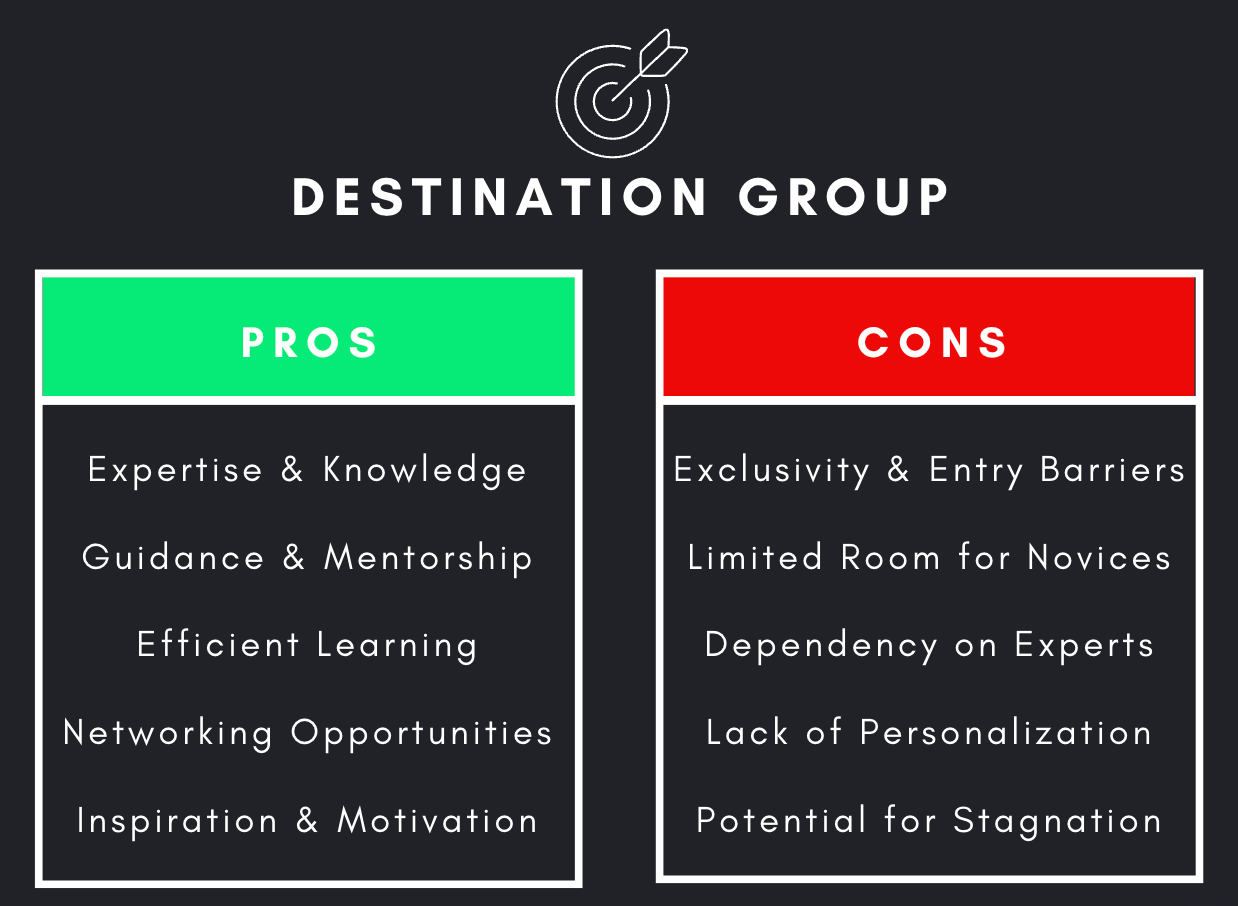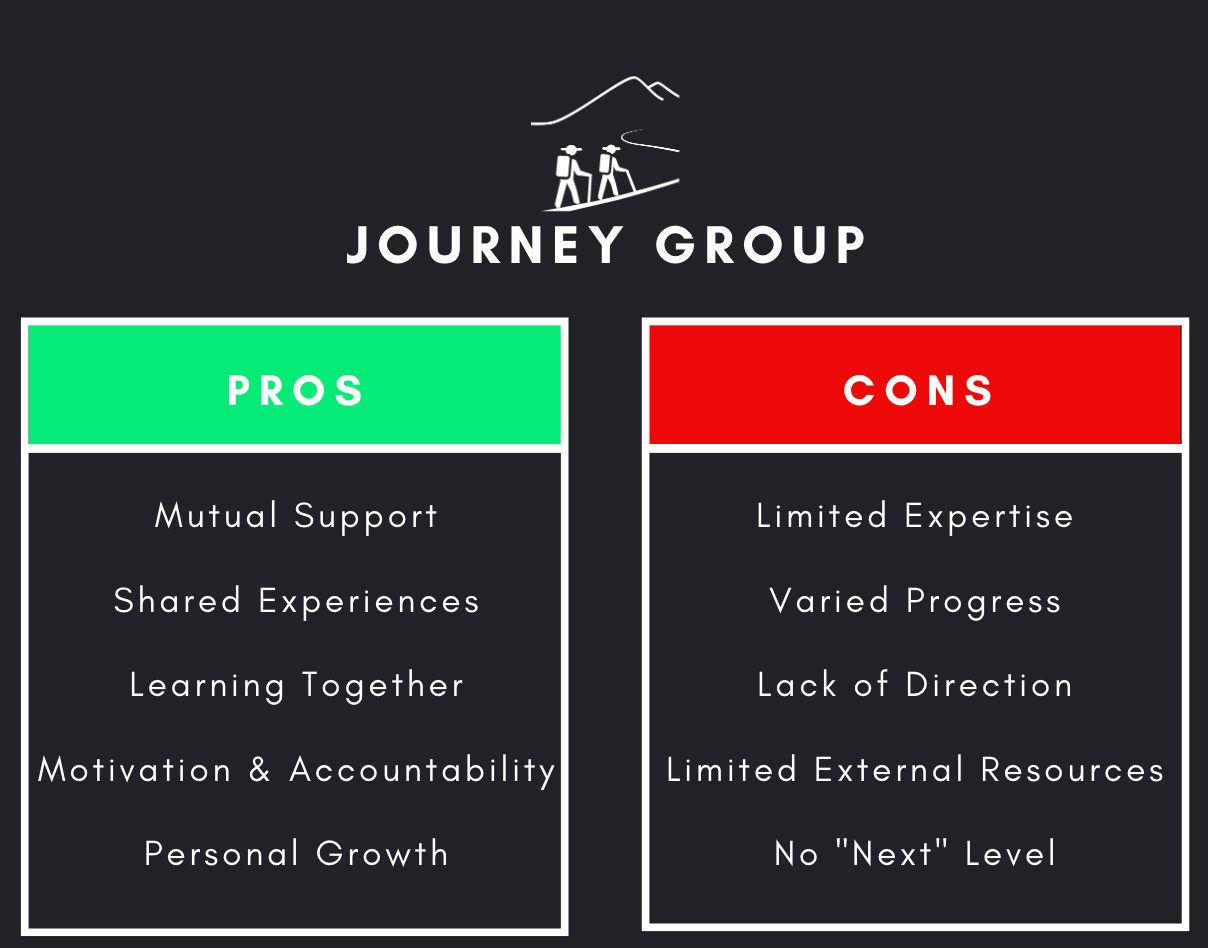The Ultimate Choice for Community Builders: Destination Groups vs. Journey Groups
Every builder has a choice to make between creating destination groups and journey groups. This choice will determine the success of your community-building efforts. We'll explore the pros and cons and provide checklists to guide you.

Hey there, fellow community builders! 👋 It's time to challenge the conventional wisdom that says the user journey is everything. Sure, it's important, but let's shift our focus to something even more impactful: creating an environment that truly enhances the user experience within our communities.
There is no information shortage with smartphones everywhere. What people are looking for is the catalyst that will turn that information into better outcomes.
The real challenge is the action shortfall, which is the gap between desire and outcome. Your community will only be as successful as its ability to articulate and deliver on that pathway.
Done properly, the right move will create an environment that sparks meaningful interactions, fosters engagement, and keeps your community members coming back for more.
Wants vs Needs Won’t Build Community
So, you’ve got a niche.
While it's tempting to focus solely on meeting the immediate desires and interests of your growing audience, true engagement requires addressing the underlying needs of community members.
You get this. This is why you sell on the wants, but deliver on the needs. Hashtag winning.
However, this paradigm is missing the most important part of what makes a community a community -- what type of people are here?
Your Critical Community Type Choice
No, we aren’t talking Discord vs Facebook groups. We’re talking structure.
Renowned behavior scientist BJ Fogg emphasizes the importance of understanding the choice between destination groups and journey groups.
Here is a great podcast introduction to BJ and the concept we are discussing today:
A Destination Group
A Destination Group refers to a community that has already achieved what you aspire to do. This is a place where people bring their experience and expertise, and other users can learn and apply it in their own situations.
Let's say you aspire to make your workout routine easier. In that case, joining a community of individuals who have already found ways to simplify their workouts can greatly benefit you. Or if you want to be an epic student at college, you would join an honor study group where others are already committed to diligent studying. By joining such a group, you'll find it easier to adopt their habits and prioritize your studies.
Being part of a community that is already engaged in your interest area will help accelerate your learning and growth.

Pros of Building a Destination Group
Expertise and Knowledge: Joining a Destination Group lets you learn from experienced individuals who have already achieved what you aspire to do. Their expertise and knowledge can fast-track your progress.
Guidance and Mentorship: Being part of a Destination Group means having access to mentors who can offer support and valuable advice. They can guide you and help you avoid common mistakes.
Efficient Learning: In a Destination Group, you can directly learn proven strategies and techniques that work, saving you time and effort compared to trial-and-error methods.
Networking Opportunities: Destination Groups attract accomplished individuals, giving you the chance to connect and collaborate with like-minded peers. This can lead to valuable partnerships and connections.
Inspiration and Motivation: Being around successful individuals in a Destination Group can inspire and motivate you to push your own boundaries and strive for excellence.
Cons of Building a Destination Group
Exclusivity and Entry Barriers: Some Destination Groups have strict entry criteria, making it difficult for everyone to join. This can limit diversity and different perspectives within the group.
Limited Room for Novices: Destination Groups are mainly focused on those who have already achieved their goals, which may leave beginners feeling left out. This can slow down the growth of newcomers.
Dependency on Experts: The effectiveness of a Destination Group relies on experts sharing their knowledge. If experts are not consistently available or engaged, the group's value may be affected.
Lack of Personalization: Destination Groups provide general guidance based on successful experiences, but they may not address the specific needs of individual members.
Potential for Stagnation: After achieving their goals, members may lose motivation and participation may decline. Without a plan for sustained engagement or transitioning to new goals, the group's vibrancy can diminish over time.
A Journey Group
A Journey Group is a place where you align with fellow novices who share a common desire for change. By embarking on this journey together, you form a supportive community that aids and encourages each other in making progress toward a shared goal.
If your aim is to study more effectively, joining a Journey Group of fellow learners at the same level as you would provide a platform for mutual support, accountability, and the exchange of valuable resources and strategies. As you navigate this path alongside like-minded individuals, you benefit from a collective sense of camaraderie, inspiration, and motivation.
Journey Groups foster an environment of growth and learning, where everyone is at a similar stage in their pursuit, allowing for empathy and understanding.

Pros of Building a Journey Group
Mutual Support: In a Journey Group, you join fellow beginners who share the same goal for change. This creates a supportive environment where you can help and encourage each other along the journey.
Shared Experiences: Being part of a Journey Group means you can relate to others who are at a similar stage in their pursuit. This fosters understanding and empathy, as you face challenges and celebrate milestones together.
Learning Together: Within a Journey Group, you can learn alongside your peers. Together, you can explore strategies, share resources, and exchange ideas that are relevant to your shared goal.
Motivation and Accountability: The group provides motivation and accountability as you hold each other responsible for progress. The shared commitment keeps you motivated to stay on track and make consistent strides forward.
Personal Growth: Being part of a Journey Group allows for personal growth as you embark on a transformative journey. The support and encouragement from your peers can help you develop new skills and habits while fostering a positive mindset.
Cons of Building a Journey Group
Limited Expertise: Journey Groups are composed of beginners, which means there may be a lack of experienced individuals who can offer expert guidance or advice.
Varied Progress: Members of a Journey Group may progress at different rates, which can create challenges in maintaining a sense of cohesion and support.
Potential Lack of Direction: Without established expertise, there may be a need for clear guidance and direction within the group, which could require additional effort in research and resource sharing.
Limited External Resources: Journey Groups may have fewer external resources available compared to established communities, making it important to seek out relevant information and support beyond the group.
No “Next” Level: As members grow and gain experience, the group may face challenges in sustaining engagement and addressing the needs of individuals who have progressed beyond the beginner stage.
Moving Forward
Both options are viable, but in order to be successful you should consider all optional Here are two checklists to keep you on track, regardless of the type of group you are building.
Destination Group Checklist
- Plan for post-goal sustainability: Develop strategies to sustain engagement and prevent a decline in participation after the objective of the destination group is achieved.
- Assess inclusivity and broader involvement: Evaluate if the group's narrow focus may exclude individuals interested in broader or ongoing community involvement. Aim for a balance between a clear objective and accommodating diverse interests.
- Mitigate burnout risks: Implement measures to manage member well-being, such as providing breaks, encouraging self-care practices, and promoting a healthy work-life balance to prevent burnout.
- Foster a supportive and collaborative environment: Create opportunities for peer-to-peer interactions, knowledge-sharing, and mentorship within the destination group to enhance engagement and prevent isolation.
- Plan for transition and succession: Develop a clear plan for transitioning members beyond the initial objective of the destination group. Provide support for continued growth and involvement within the community, ensuring a smooth transition to new goals or offering leadership opportunities.
Journey Group Checklist
- Establish adaptable structures: Create a framework that can accommodate the evolving needs and goals of community members within the journey group. Ensure flexibility to adjust as the group progresses and new objectives emerge.
- Balance individual and collective growth: Find the right equilibrium between addressing the unique needs of individual members and maintaining a collective focus within the journey group. Foster an environment where personal growth aligns with the overall goals of the group.
- Provide continuous value: Consistently offer valuable resources, activities, and opportunities for growth to keep community members engaged and motivated throughout their ongoing journeys. Regularly assess and enhance the content and experiences provided.
- Foster a supportive community culture: Encourage open communication, empathy, and collaboration among journey group members. Create an environment where individuals feel safe to share their experiences, seek support, and celebrate milestones together.
- Encourage self-reflection and goal setting: Promote self-reflection within the journey group by encouraging members to set meaningful goals, track progress, and evaluate their personal growth. Provide tools and support for members to assess their own journeys.
Final Words
As community builders, the choice between destination groups and journey groups is a significant one. Understanding the characteristics, benefits, and considerations of each empowers us to create communities that effectively serve their members' needs and aspirations. By applying insights from BJ Fogg's research and considering our specific community goals, we can build thriving and impactful communities that foster growth, and connection.
If you're looking to learn more, consider reading An Exponential Framework to Evolve How Community Scales Your Impact and Outcomes or Managing the Doors to Your Community.
Happy building!
